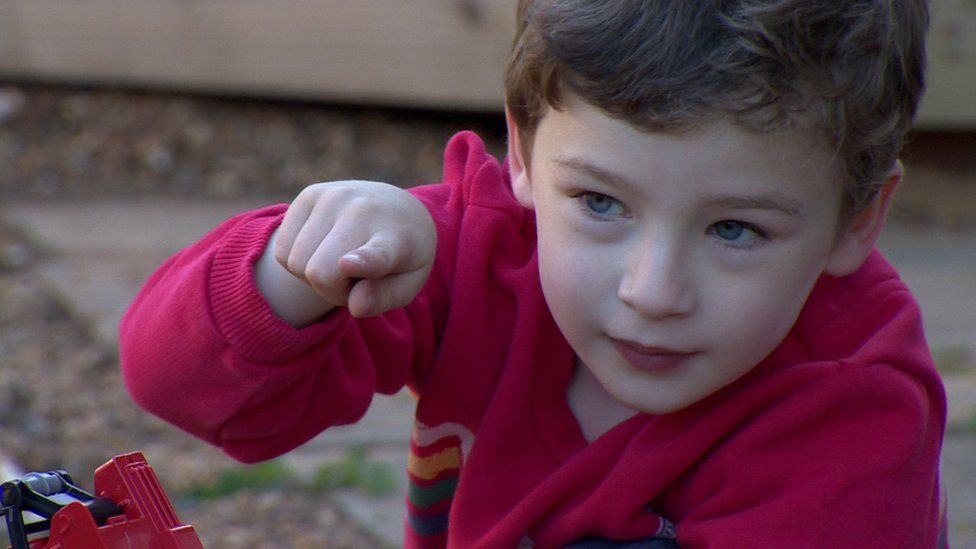ARTICLE AD BOX
By Marie-Louise Connolly
BBC News NI Health Correspondent

Luke Adgey was diagnosed with RSV when he was born
Parents need to be more alert to the symptoms of respiratory syncytial virus (RSV), medical scientists have said.
Once a seasonal virus, there has been a surge in RSV cases throughout the year, including in Northern Ireland.
It usually causes colds in adults but can be fatal for babies and the elderly. As yet there is no vaccine.
RSV is the most common cause of bronchiolitis in children under two and typically case numbers peak in winter, but it has risen across 12 months.
Queen's University is hosting a conference this week on RSV with experts from around the world discussing developments in respiratory illnesses.
Ultan Power, a professor of molecular virology, said: "[RSV] was not detected for over a year during the Covid-19 pandemic and when it came back, it did so in the summer of 2021 and again this summer."
Dr Power said the outbreak peaked in July this year.
Dr Ultan Power says RSV continues to circulate today
"For children under five years of age, 22% who presented to their doctors with a respiratory infection had RSV," he said.
"RSV continues to circulate today, with about 9% of infants with respiratory infections having RSV."
Dr Power said RSV is associated with the development of a wheeze later in life.
"There is some evidence suggesting that severe RSV infections in infants may lead to asthma," he added.
'We dread it'
Luke has just started school and his mother is concerned about what will happen as the weather gets colder
Susan Adgey's four-year-old son, Luke, has been hospitalised with RSV twice in the past month which, she said, has been debilitating and upsetting as he has just started primary school.
Luke was diagnosed with RSV when he was born prematurely at 30 weeks.
From that primary infection he has had several significant respiratory issues over the years.
Speaking to BBC News NI, Ms Adgey, from County Down, said they noticed Luke was tiring very easily and he was working "very hard to breath and his oxygen levels were falling significantly".
"The winter is a waiting game for us; we dread it waiting to see if there is going to be any more infection as it is so present especially in this season," she said.
Ms Adgey said people must understand the threat of RSV and that for some, especially children, it is not just a little sniffle or cold.
Dr Lindsay Broadbent is leading the research on respiratory viruses and is working to understand any potential long-term consequences of the infection.
In a recent poll of more than 1,000 people, carried out by Dr Broadbent, fewer than 50% of people had heard of RSV.
Dr Broadbent said she wants more people to become familiar with the virus and for scientists to have a greater understanding of it.
Research shows that RSV infection is the most significant cause of hospitalisation in infants and one of the leading global causes of infant mortality.
In the UK, RSV accounts for approximately 450,000 GP appointments, 29,000 hospitalisations and 83 deaths per year in children and adolescents.
Image source, Getty Images
Image caption,The respiratory syncytial virus (RSV) is a common single-RNA stranded virus that causes infected cells to fuse together
There are currently no specific treatments for it and the management is purely supportive with oxygen and feeding support for young children.
How to spot RSV?
- RSV starts with a blocked or runny nose and can progress to a dry cough, fever and sometimes breathing problems
- For most children, it will be mild and can be treated at home with infant paracetamol or ibuprofen
- Call your GP or seek medical advice if your child is not feeding normally, is breathing fast or has a high temperature that will not go down
- Call 999 if your child is exhausted from trying to breathe - you may see the muscles under their ribs sucking in with each breath or they may be pale and sweaty

 2 years ago
74
2 years ago
74








 English (US) ·
English (US) ·